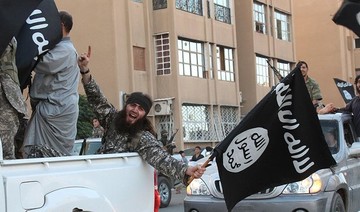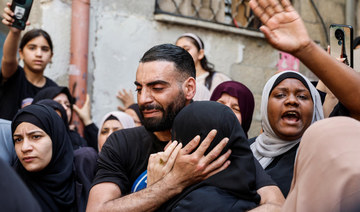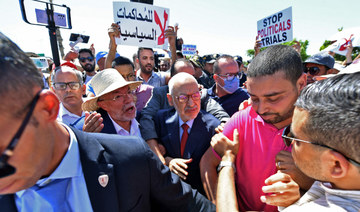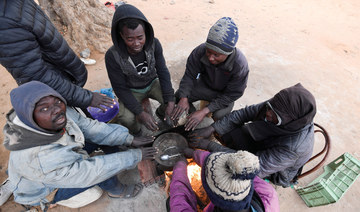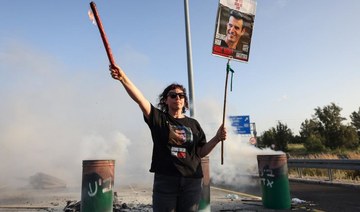DAMASCUS: Syria’s top diplomat told the outgoing UN envoy Wednesday to stay out of matters concerning the war-torn country’s constitution, state media reported, while the UN official said they had “a very intense exchange of opinions.”
Foreign Minister Walid Al-Moualem reportedly told UN envoy Staffan de Mistura that the constitution is a “sovereign” matter and that Damascus will not allow any foreign intervention or meddling in it.
The remarks were carried by the state-run SANA news agency after the two met in Damascus.
De Mistura announced he would resign for personal reasons earlier this month after years of mediating peace talks that led nowhere. But he said he hoped to broker an agreement on advancing a new constitution for Syria before stepping down next month.
The opposition has called for a new constitution that would allow for a political transition away from the Assad family’s decades of rule. But after a string of major victories, the government shows little interest in making any concessions.
“During the meeting we had a very frank, a very intense exchange of opinions concerning the constitutional committee and the political process in general,” de Mistura told reporters after the meeting. He said he will not elaborate because he still has to brief the UN secretary-general and the Security Council.
A statement released by de Mistura’s office later said the UN envoy will be engaging in “intensive further consultations” to explore the possibility of convening a Syrian constitutional committee.
Al-Moualem was quoted by SANA as saying that “the constitution and everything related to it are purely a sovereign affair that is decided by the Syrian people without any foreign intervention.”
De Mistura told Security Council members last week that while there is agreement on the 50-member government and opposition delegations for the drafting committee, the government objects to a third 50-member delegation that the UN put together representing Syrian experts, civil society, independents, tribal leaders and women.
De Mistura has been trying since February to set up a constitutional committee as a key step toward elections and a political settlement to the more than seven-year Syrian conflict, which has killed some 400,000 people.
Syria tells outgoing UN envoy to stay out of constitution
Syria tells outgoing UN envoy to stay out of constitution
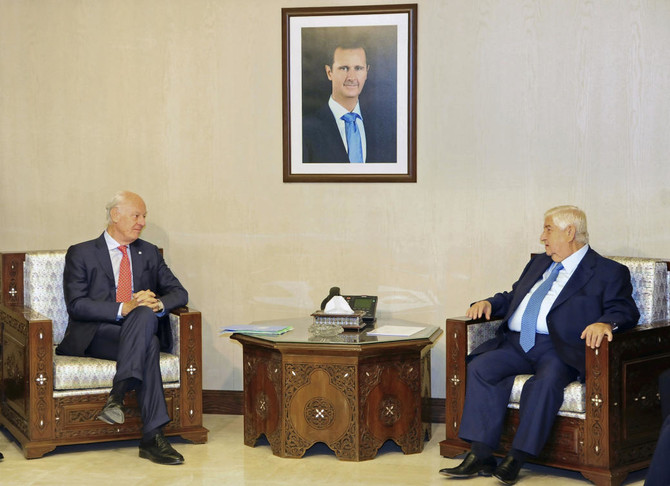
- The remarks were carried by the state SANA news agency as Al-Moallem and de Mistura met in Damascus
- De Mistura said he would make a final effort before stepping down next month to advance toward a new constitution for Syria
Relative calm in southern Lebanon amid talks on French peace plan and Israeli-US coordination
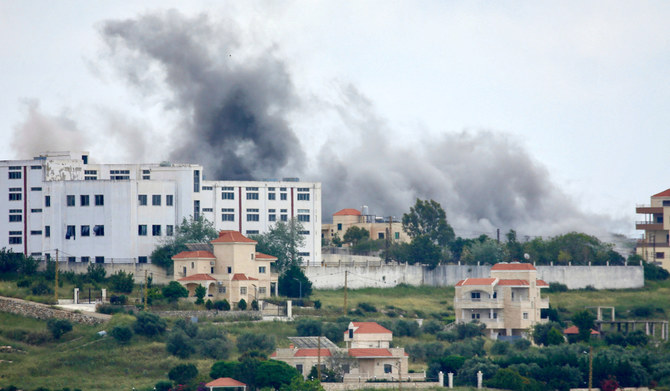
- Lebanese officials receive amended proposal that summarizes meetings held by Stephane Sejourne, France’s foreign minister, in Lebanon and Israel
- On Friday and Saturday there was a noticeable decline, generally, in hostilities between the two sides in southern Lebanon, though there were exceptions
BEIRUT: Discussions continued on Saturday about a French proposal designed to ease tensions and halt clashes between the Israeli army and Hezbollah along Lebanon’s southern border.
Lebanese officials received an amended version of the proposal on Friday, which summarized meetings held by Stephane Sejourne, France’s foreign minister, in Lebanon and Israel.
The proposal also aims to ensure the full implementation of UN Security Council Resolution 1701, which was adopted in 2006 with the aim of resolving the war that year between Israel and Hezbollah.
One political observer said Lebanese officials had prepared a response to the French document and were awaiting Israel’s response.
On Friday and Saturday there was a noticeable decline, generally, in hostilities between the two sides in southern Lebanon, though there were exceptions. One of them was the targeting of the “Israeli Meron Airbase in the Safed area on Friday from Lebanese territories,” Israeli authorities said. Hezbollah did not immediately claim responsibility for the attack. However, the group did say it shelled the Israeli site of Bayad Blida at dawn on Saturday while Israeli soldiers were there.
Meanwhile, the Israeli army opened fire in the vicinity of a shepherd in Wazzani but he was unharmed. Israeli artillery targeted Aita Al-Shaab, Jabal Blat and the outskirts of the towns of Naqoura and Alma Al-Shaab.
Extreme caution seemed to prevail in many border areas as Israeli reconnaissance warplanes continued to operate over Hasbaya and the occupied Shebaa Farms, reaching Western Bekaa and Iqlim Al-Tuffah.
In addition to the diplomatic processes related to the French peace plan, Lebanese authorities were also awaiting the outcome of negotiations in Cairo for a possible agreement between Israel and Hamas on a ceasefire in Gaza. Hezbollah previously linked any end to hostilities in southern Lebanon along the border with Israel to a ceasefire in the Gaza Strip.
Channel 12 news in Israel reported on Saturday that the security establishment in Tel Aviv believed Israeli authorities were close to an agreement with Hezbollah and Lebanon, similar to the provisions of UN Resolution 1701. It said the Israeli security establishment was working with US officials on the process, including American envoy Amos Hochstein, who oversaw indirect negotiations between Lebanon and Israel to demarcate their maritime borders in 2022.
Regarding the French peace plan, Nabih Berri, the speaker of the Lebanese Parliament, said he had received a copy of the document from the French Embassy in Lebanon and will respond.
“It included acceptable points and others that are unacceptable and must be amended, subject to discussion and review,” he added.
The revised proposal refers to a previous ceasefire agreement signed by Israel and Lebanon on April 26, 1996. It also highlights the steps that can be “taken to stop the escalation and ensure the effective implementation of UN Resolution 1701.”
Media leaks suggested its recommendations included “creating a monitoring group with the US, France, Lebanon and Israel. This group would oversee implementation and address any complaints from the involved parties in stages.”
The first stage would require Lebanese armed groups to halt their military operations inside Israel and disputed border regions, refrain from attacking personnel or facilities belonging to the UN Interim Force in Lebanon, and guarantee unrestricted freedom of movement for UNIFIL forces, including patrols in all areas south of the Litani River.
It calls on Israel to “halt military operations inside Lebanon, including airstrikes on Lebanese territory, refrain from any actions that may put UNIFIL personnel or facilities at risk, and ensure UNIFIL’s freedom of movement, including stopping the locking of aircraft radars on UNIFIL naval forces ships.”
Regarding UNIFIL’s mission in the first phase, the French initiative said the force will be “monitoring the cessation of hostilities on the ground and increasing the number of patrols and redeployments along the Blue Line to ensure effective respect for the cessation of hostilities and subsequent commitments by the parties.”
The Blue Line is a demarcation line dividing Lebanon from Israel that was set by the UN in June 2000 to determine whether Israeli forces had fully withdrawn from Lebanon.
The second phase of the French initiative, to be implemented within three days, would involve “dismantling all installations, facilities and centers near the Blue Line, including containers, small towers and tents, and the withdrawal of combat forces, including the Radwan militia, and military capabilities, including shooting capabilities in depth and anti-tank systems, for a distance of not less than 10 kilometers north of the Blue Line.”
It would also require Israel to “stop flying over Lebanese airspace.” It urges Lebanon to resume meetings of the tripartite mechanism, involving UNIFIL and the Israeli and Lebanese militaries, and deploy about 15,000 Lebanese soldiers along the Blue Line south of the Litani River, with UNIFIL and other international partners supporting this deployment.
During a 10-day third phase, Lebanon and Israel, with UNIFIL support, would be expected to resume talks about their land borders. These are intended build on negotiations that took place in 2017, and focus on areas already discussed in 2018 within the framework of the UNIFIL tripartite mechanism, with the aim of establishing an area between the Blue Line and the Litani River free of armed groups and weapons other than those related to the Lebanese government and UNIFIL.
These talks would take place in parallel with international efforts in the form of a support group to assist in the deployment of Lebanese forces in the southern region, and the social and economic development of the region.
Israeli forces kill five Palestinians in overnight raid near West Bank’s Tulkarm
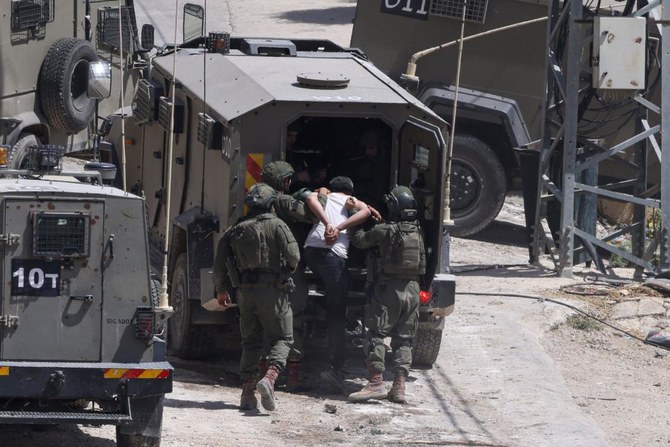
- The health ministry said it had identified four of the five who died during the raid in Deir Al-Ghusun
- The Israeli military said an officer from a special police unit was wounded in the operation and hospitalized
TULKARM, West Bank: Israeli forces killed five Palestinians in an overnight raid in a village near the city of Tulkarm in the occupied West Bank, the Palestinian health ministry and the Israeli military said on Saturday.
The health ministry said it had identified four of the five who died during the raid in Deir Al-Ghusun. Israeli forces took some of the dead bodies, according to the official Palestinian news agency Wafa and a Reuters reporter at the scene.
The Israeli military said an officer from a special police unit was wounded in the operation and hospitalized. It said its forces retaliated using live ammunition and shoulder-fired missiles after they were fired on.
Saturday’s operation near the flashpoint city of Tulkarm was the latest in a series of clashes in the occupied West Bank between Israeli forces and Palestinians that has been escalating for more than two years but which has picked up in intensity since the Hamas-led attack on Israel last October.
According to Palestinian Health Ministry records, 492 Palestinians have been killed by Israeli forces or Jewish settlers in the West Bank or East Jerusalem since Oct. 7. Many have been armed fighters but stone-throwing youths and uninvolved civilians have also been killed.
Palestinians want the West Bank and Gaza, which Israel captured in the 1967 Middle East war, as the core of an independent state with East Jerusalem as its capital.
US-backed talks to reach an agreement between Israel and the Palestinians have been stalled for the past decade but the Gaza war has raised pressure for a revival of efforts to reach a two-state solution.
More than 34,000 Palestinians have been killed in Israel’s seven-month-old assault on the Gaza Strip, say health officials in the Hamas-ruled enclave. The war began when Hamas militants attacked Israel on Oct. 7, killing 1,200 people and abducting 252 others, of whom 132 are believed to remain in captivity in Gaza, according to Israeli tallies.
Tunisian protesters demand eviction of migrant encampment
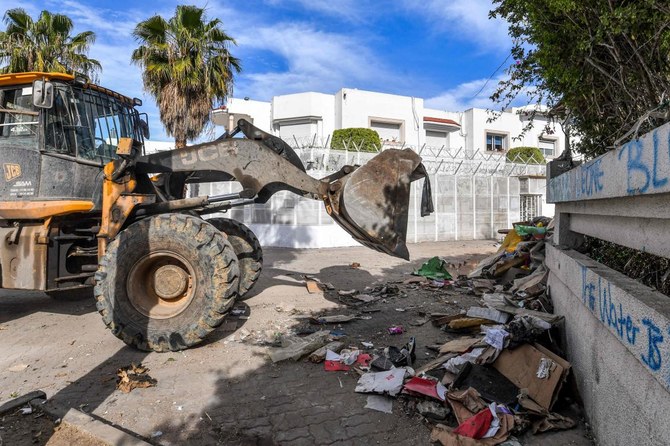
- The demonstration in the small town in central Tunisia follows recent crackdowns by authorities on similar encampments in the capital Tunis and other areas
- In El Amra, protesters called for the “departure” of migrants and the “quick” eviction of the thousands estimated to be staying there
EL AMRA, Tunisia: Hundreds of Tunisians rallied Saturday in the town of El Amra to protest makeshift camps for migrants primarily from sub-Saharan African countries, an AFP correspondent said.
The demonstration in the small town in central Tunisia follows recent crackdowns by authorities on similar encampments in the capital Tunis and other areas, often after complaints from local residents.
In El Amra, protesters called for the “departure” of migrants and the “quick” eviction of the thousands estimated to be staying there, the correspondent said.
Lawmaker Tarek Mahdi said that the “immediate solution” should be to get migrants to “leave urban areas and cities.”
The situation has become “unacceptable” and “the authorities must find a solution,” said Mahdi, who represents El Amra in parliament.
He added that other countries should help Tunisia to deal with a “very significant flow” of migrants.
The town is located about 40 kilometers (25 miles) north of Sfax, a key departure point for Europe-bound sea journeys from where migrants had been forcibly removed late last year.
Many migrants have fled to towns like El Amra, setting up encampments before they can make the perilous Mediterranean crossing, as Tunisian authorities and the European Union have ramped up efforts to curb irregular migration.
A surge of anti-migrant violence last year, following remarks by President Kais Saied who painted “illegal” foreigners as a demographic threat, has also pushed many out of main cities and into smaller towns.
Migrants attempting the sea crossing in search of a better life in Europe often aim to reach Italy, whose Lampedusa island lies some 150 kilometers away from Sfax, Tunisia’s second city.
In recent weeks, authorities raided several encampments, tearing down tents and expelling migrants.
The non-governmental Tunisian Forum for Social and Economic Rights said that authorities in Tunis on Friday cleared encampments and expelled hundreds of asylum seekers, migrants and refugees, sending them in buses to a western area near the Algerian border.
In a statement, the interior ministry said “security measures” had been taken to “deal with attacks on public and private property.”
Last month, Italian Prime Minister Giorgia Meloni visited Tunisia for a fourth time in less than a year to sign deals aiming to curb migration.
A day before her visit, Saied said that Tunisia must not become “a country of transit or settlement” for the tens of thousands of migrants attempting to cross the Mediterranean to Europe every year.
‘Substantial progress’ in Cairo talks on Gaza truce
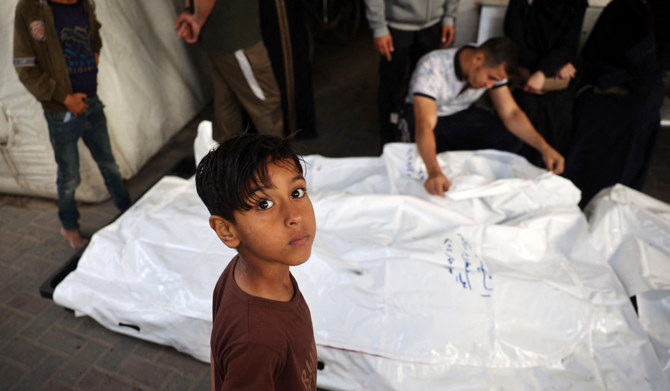
- The second phase will last at least six weeks, with both sides agreeing to release a larger number of hostages and prisoners, and also committing to a longer halt to the fighting
CAIRO: Talks in Cairo involving a Hamas delegation and Egyptian mediators have made substantial progress toward achieving a ceasefire in Gaza, according to a high-ranking source.
The source, who preferred not to be named, told Cairo News Channel that Hamas representatives and an Egyptian security delegation have reached consensus on many contentious points.
Hours before the Hamas delegation’s arrival in Cairo on Saturday, Gen. Abbas Kamel, chief of Egypt’s General Intelligence Directorate, received a phone call from the movement’s leader, Ismail Haniyeh, concerning the negotiations.
Security and political expert Ahmed Mustafa told Arab News: “According to my information, Hamas has agreed to the first phase of the ceasefire deal in Gaza.
“This includes the release of a number of hostages, with the assurance that Israel will fully withdraw from Gaza after 124 days, upon completion of the three stages of the major agreement being coordinated here in Cairo.”
Mustafa also said the Hamas delegation in Cairo is expected to inform the Egyptian side of its agreement with only minor amendments.
“I believe that Hamas has agreed on some terms with the Egyptian mediators now, and previously with the Qatari mediators under American guarantees,” he said.
However, Mustafa said that Israel’s refusal to end the war in Gaza as part of any hostage deal and its determination to eliminate what remains of Hamas remain “major points of contention.”
According to Mustafa, another point of disagreement concerns allowing the entry of dual-use materials into the enclave, for example humanitarian supplies that could also be used for combat purposes, such as fuel.
He said that the first phase, which Hamas “has tentatively agreed upon, will last up to 40 days, during which up to 33 of more than 100 Israeli hostages held in Gaza since Oct. 7 will be released.”
The second phase will last at least six weeks, with both sides agreeing to release a larger number of hostages and prisoners, and also committing to a longer halt to the fighting.
Aboud Jamal, a researcher on Palestinian affairs, told Arab News: “Hamas announced on Friday evening that settlements had been reached, and a delegation from the movement would head to Cairo on Saturday to secure an agreement in a way that meets the demands of the Palestinians.”
Jamal added: “It is clear that the coming days will witness an agreement to cease fire along with the release of some Israeli hostages.
“The only remaining issue is the stance of the Israeli government, which seems to want to prolong the war to maintain (Benjamin) Netanyahu’s government following the recent protests against him in Israel.”
Jamal said the Israeli government stands to benefit by obstructing any agreement.
“So, by sending its delegation to Cairo and discussing its agreement to terms in the prospective deal through mediators, Hamas has preempted the Tel Aviv government, a move for which the movement’s leaders are to be commended.”
He added: “It appears that Egypt truly stands with the Palestinian people and is supportive of reaching an agreement that ensures a ceasefire to save what can be saved of the lives of Gaza’s residents.
“This was evident from the statement issued by Hamas before its security delegation headed to Cairo, stating that Hamas leader Ismail Haniyeh appreciates the role that Egypt is playing.”
UN official warns famine in northern Gaza is already ‘full-blown’
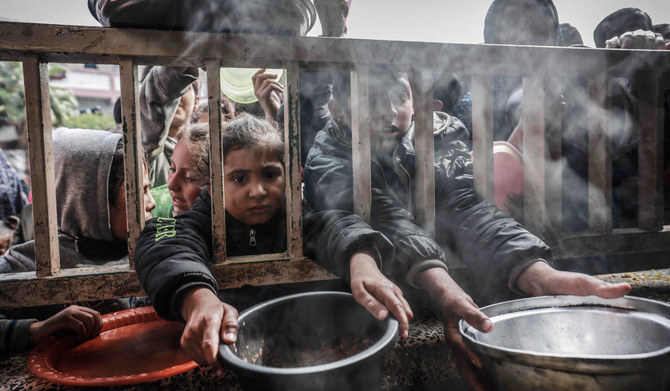
- Israel has killed more than 34,000 Palestinians since Oct. 7 attacks by Hamas
- There was no immediate comment from Israel, which controls entrance into Gaza
WASHINGTON: A top UN official said Friday that hard-hit northern Gaza was now in “full-blown famine” after more than six months of war between Israel and Hamas and severe Israeli restrictions on food deliveries to the Palestinian territory.
Cindy McCain, the American director of the UN World Food Program, became the most prominent international official so far to declare that trapped civilians in the most cut-off part of Gaza had gone over the brink into famine.
“It’s horror,” McCain told NBC’s “Meet the Press” in an interview to air Sunday. “There is famine — full-blown famine — in the north, and it’s moving its way south.”
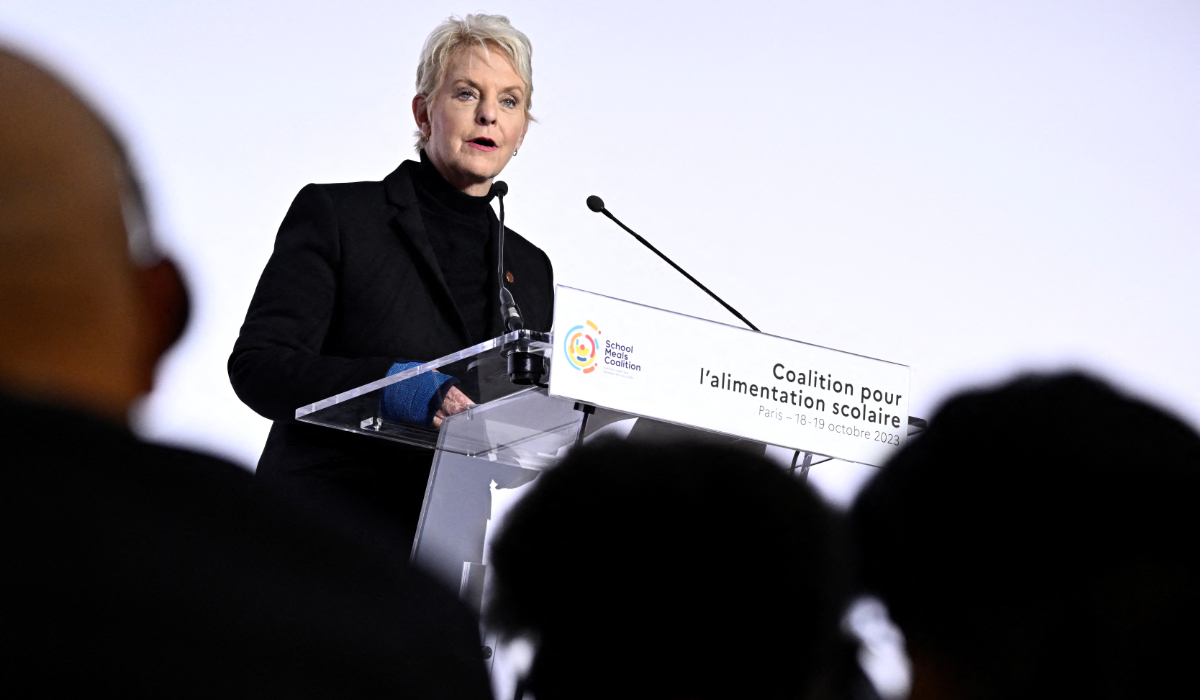
She said a ceasefire and a greatly increased flow of aid through land and sea routes was essential to confronting the growing humanitarian catastrophe in Gaza, home to 2.3 million people.
There was no immediate comment from Israel, which controls entrance into Gaza and says it is beginning to allow in more food and other humanitarian aid through land crossings.
The panel that serves as the internationally recognized monitor for food crises said earlier this year that northern Gaza was on the brink of famine and likely to experience it this month. The next update will not come before this summer.
One of the US Agency for International Development’s humanitarian officials in Gaza told The Associated Press that on-the-ground preparations for a new US-led sea route were on track to bring in more food — including treatment for hundreds of thousands of starving children — by early or mid-May. That’s when the American military expects to finish building a floating pier to receive the shipments.
Ramping up the delivery of aid on the planned US-backed sea route will be gradual as aid groups test the distribution and security arrangements for relief workers, the USAID official said.
The official spoke on condition of anonymity over security concerns for work done in a conflict zone. They were some of the agency’s first comments on the status of preparations for the Biden administration’s $320 million Gaza pier project, for which USAID is helping coordinate on-the-ground security and distribution.
At a factory in rural Georgia on Friday, USAID Administrator Samantha Power pointed to the food crises in Gaza and other parts of the world as she announced a $200 million investment aimed at increasing production of emergency nutritional paste for starving children under 5.
Power spoke to factory workers, peanut farmers and local dignitaries sitting among pallets of the paste at the Mana nonprofit in Fitzgerald. It is one of two factories in the US that produces the nutritional food, which is used in clinical settings and made from ground peanuts, powdered milk, sugar and oil, ready to eat in plastic pouches resembling large ketchup packets.
“This effort, this vision meets the moment,” Power said. “And it could not be more timely, more necessary or more important.”
Under pressure from the US and others, Israeli officials in recent weeks have begun slowly reopening some border crossings for relief shipments.
But aid coming through the sea route, once it’s operational, still will serve only a fraction — half a million people — of those who need help in Gaza. Aid organizations including USAID stress that getting more aid through border crossings is essential to staving off famine.
Children under 5 are among the first to die when wars, droughts or other disasters curtail food. Hospital officials in northern Gaza reported the first deaths from hunger in early March and said most of the dead were children.
Power said the UN has called for 400 metric tons of the nutritional paste “in light of the severe hunger that is pervading across Gaza right now, and the severe, acute humanitarian crisis.” USAID expects to provide a quarter of that, she said.
Globally, she said at the Georgia factory, the treatment made there “will save untold lives, millions of lives.”
USAID is coordinating with the World Food Program and other humanitarian partners and governments on security and distribution for the pier project, while US military forces finish building it. President Joe Biden, under pressure to do more to ease the humanitarian catastrophe in Gaza as the US provides military support for Israel, announced the project in early March.
US Central Command said in a statement Friday that offshore assembly of the floating pier has been temporarily paused due to high winds and sea swells, which caused unsafe conditions for soldiers. The partially built pier and the military vessels involved have gone to Israel’s Port of Ashdod, where the work will continue.
A US official said the high seas will delay the installation for several days, possibly until later next week. The official, who spoke on condition of anonymity to discuss operation details, said the pause could last longer if the bad weather continues because military personnel and divers have to get into the water for the final installation.
The struggles this week with the first aid delivery through a newly reopened land corridor into north Gaza underscored the uncertainty about security and the danger still facing relief workers. Israeli settlers blocked the convoy before it crossed Wednesday. Once inside Gaza, the convoy was commandeered by Hamas militants, before UN officials reclaimed it.
In Gaza, the nutritional treatment for starving children is most urgently needed in the northern part of the Palestinian territory. Civilians have been cut off from most aid supplies, bombarded by Israeli airstrikes and driven into hiding by fighting.
Acute malnutrition rates there among children under 5 have surged from 1 percent before the war to 30 percent five months later, the USAID official said. The official called it the fastest such climb in hunger in recent history, more than in grave conflicts and food shortages in Somalia or South Sudan.
One of the few medical facilities still operating in northern Gaza, Kamal Adwan hospital, is besieged by parents bringing in thousands of children with malnutrition for treatment, the official said. Aid officials believe many more starving children remain unseen and in need, with families unable to bring them through fighting and checkpoints for care.
Saving the gravely malnourished children in particular requires both greatly increased deliveries of aid and sustained calm in fighting, the official said, so that aid workers can set up treatment facilities around the territory and families can safely bring children in for the sustained treatment needed.



